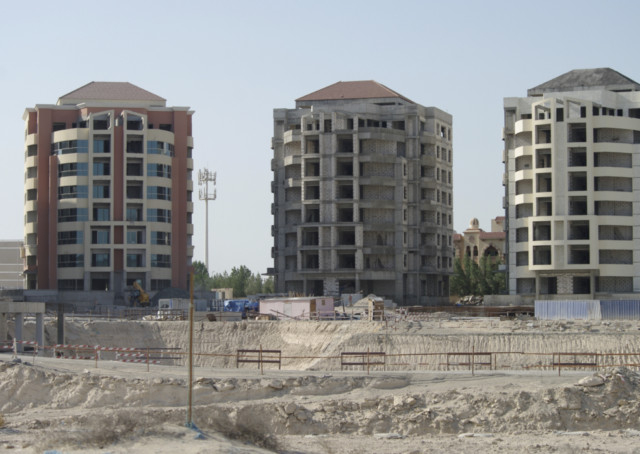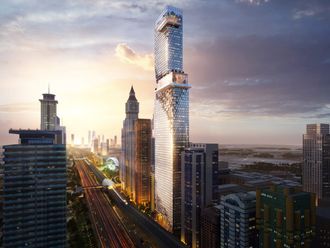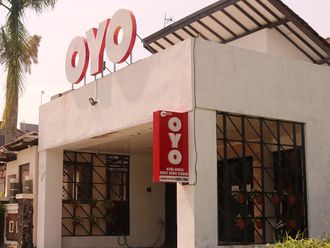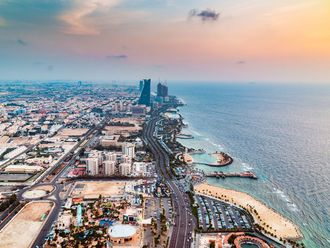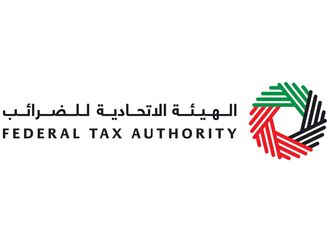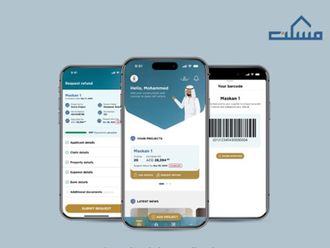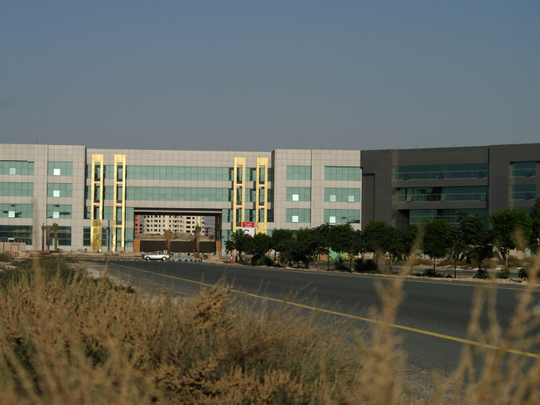
Developer Schon Properties is readying its projects in Dubai Investments Park (DIP). Schon Business Park, now over 70 per cent completed, is set for handover in the second quarter of this year, while work continues on its Dubai Lagoon residential project.
“We can announce now that [the] Schon crisis is over. We will be delivering the first building in Dubai Lagoon — with minor finishing work going on — within two months,” says Firas Hassan, CEO of Schon Properties.
Launched in 2005, the developer today expects the much delayed Dubai Lagoon, with one million square feet of built-up area and valued at Dh2.7 billion, to be completed within two to three years, thanks to several plans it has put in place. Dubai Lagoon consists of 46 residential buildings with 36,888 units, several gyms, a mosque and a retail centre, with the lagoon snaking through the project.
“At the beginning of the project we faced two years’ delay as the RTA cut a piece of the project because of road zoning. So we had to redesign the whole project and then building approvals were delayed. We started construction, but then the global financial crisis meant that investors defaulted and we got further delayed,” Hassan says.
The developer is currently working on completing eight buildings (442 apartments all pre-sold) in Zone 1 (Lotus) thanks to its plan B, which is to take the receivables of Dh14 million of the first building to be handed over within two months, covering the construction cost of the next two buildings, handing them over and using the same method to complete the other buildings in Lotus within the next six to seven months. Then the receivables of Zone 1 of around Dh35 million would then be reallocated to the project.
“Work is slow at the moment but it won’t stay like that. We’ve been doing this over the past two years because of the financial difficulty we couldn’t go fully fledged. So we decided to deliver building by building with the resources we have. We didn’t take any finance for this project from the banks as it increases the construction costs significantly,” explains Hassan, adding that construction prices were renegotiated during the crisis, with one contractor accepting and the others being terminated.
The developer invested everything that had been collected in the project, the major part being its infrastructure — its Dewa sub-station alone cost Dh54 million. Hassan partly blames the 50/50 prior and upon-completion payment plan, which seemed like a good sales strategy during the boom time for the lack of finance to complete the project.
“We built the sub-station — it is not connected yet — to feed a project two times the size of this project. If we are allowed we can supply to those who don’t have a sub-station, such as our neighbours,” says Hassan.
Dubai Expo impact
The developer worked out a construction-milestone linked plan with Dubai’s Real Estate Regulatory Agency (Rera) back in 2010, offering discounts to investors to accelerate construction.
“Due to the global financial crisis, investors defaulted causing further delay. The construction-linked plan was optional for buyers, some accepted it, and some didn’t, due to the downturn they weren’t interested in paying more instalments and getting their units because they wouldn’t have found a tenant at that time,” Hassan says.
Now with the Dubai Expo 2020, the market has picked up, and with it the fortunes of Dubai Lagoon, close to Dubai World Central, the Expo’s site.
“We faced huge difficulties to complete and deliver the project and investors have a right to ask how we are going to do it now, it’s a genuine question,” Hassan says, calling the Expo a gift from God, and adding that stricter regulations and increased transparency by the land department and the Central Bank of the UAE, keeping speculators at bay, will ensure a future bubble is not formed. “We’re really optimistic about the market. Before prices in DIP weren’t picking up, but now they have increased by 40 per cent over the past three months. Yet, you can still find units for less than Dh1,000 per square foot. Now that the Expo has been announced and the Al Maktoum airport has opened, it will change the game plan for this area completely. Investors and contractors want to come into the area,” he adds.
As the company lawyer and now CEO, Hassan is well aware of the disputes he has to deal with and reckons that the new circumstances will encourage those who stayed with the project — mostly end users buying a home close to work — to pay.
“We faced most of our problems with the speculators; the end users, although some did default, are still looking for results not for a fight or exit — they are looking for their units and not their money back,” he remarks. The speculators caused another problem by selling on to others and collecting money from them.
“Most buyers have made payments of 40 per cent up to now. Apart from Zone 1, the others are linked to construction. I believe the tough times are over. The Expo is a reward for investors who were patient and stuck with us. They will be compensated as prices are double now than when they purchased,” Hassan adds.
Further good news for buyers could come soon if the developer’s plan A, which would see construction of the whole of Dubai Lagoon completed within two to three years, is signed off.
Plan B was put in place to keep things going. “At present we’re using all the available resources to cure things and not stop building completely, but that is only plan B. Delivering one building will change the perception of the project in the eyes of the investor,” says Hassan.
Plan A essentially involves striking up joint ventures with contractors for them to build whatever hasn’t been built yet. Zones 2 and 4 are at the basement stage, Zone 3 (Lily) has several floors completed, and the others are still bare. The contractors are being paid in units instead of cash.
“Our plan A means there will be a mutual interest, while benefiting the investor. Each contractor will conclude its buildings with their own financial means as they won’t receive any cash at all and can then sell the units, so it’s in their interest to finish as soon as possible so they can liquidate their assets. The developer wants to get rid of his liability to deliver and the investors will get their units eventually after all this delay, which made things difficult over the past five years,” says Hassan.
Contractor benefits
Around 64 per cent of the project is sold, but the idea is to give the contractors the remaining inventory at a competitive price so that they can make a profit reselling.
“The contractor benefits in two ways, one, they are using their resources as a contractor working and, two, they are making profit from the flats. They have already agreed to the principle. Now it’s a matter of them going over the reports given to them by independent auditors. Once the contract is signed we will announce it with full transparency, which will be done by the Land Department in liaison with Rera and they will supervise,” Hassan adds.
The Schon Business Park houses 296 shell and core offices, which range from 2,500 to 5,000 square feet, and has 137 outlet units for shops and restaurants, a mere 1.5km away. The developer plans to use its receivables for Dubai Lagoon.
“The business park is another strength we have. Our receivables there amount to Dh150-Dh160 million upon completion and our inventory is more than 200,000 square feet. We expect money out of the park in five to six months of around Dh300 million. We will sell our remaining inventory or rent what we don’t sell. So in case any negotiations with any of the contractors in terms of our plan A for Dubai Lagoon fails, the plan C is that we will inject that money into the Dubai Lagoon project and get it done,” he adds.
The Dubai Lagoon project came before the Schon Business Park, but the latter didn’t suffer the same zoning and permit delays. “So we could already achieve some percentage of construction prior to the crisis. And the project is smaller, so it was easier to finish it,” he says.
Dubai Lagoon is right next to Ewan, lived in for seven years, and the opening of new schools, etc. will make the area more attractive. As for the success of the business park, its proximity to the Expo and the Al Maktoum International Airport would make it the ideal premises for countries that participate in the Expo.
“The unique location of this project, the amenities — we have 100,000 square feet of retail, two basements with 1,300 parking spaces — one of the biggest commercial complexes here in DIP very close to Expo, mean demand will be very high,” Hassan says.
Despite plan C, Hassan hopes plan A will fall into place. “If we close the deal with the contractors, the whole game plan will change and the project will go into fully fledged construction; the programme we are negotiating with the contractors for the zones that haven’t started yet is two to three years to completion,” he says.
A separate contractor will be taken on for the retail centre, serving the whole project in Zone 9, while the developer says the mosque in Zone 7 is not a worry in terms of cost, as many people already declared they would like to chip in. In the meantime some convenience stores will pitch up on the ground floor of some of the buildings as they complete.
The lagoon being built by the Chilean Crystal Lagoons will have its first water flowing within a year.
“We’re going to first finish and fill the pilot lagoon in the first completed zone. Then we do the rest in parts as we complete,” Hassan explains.


